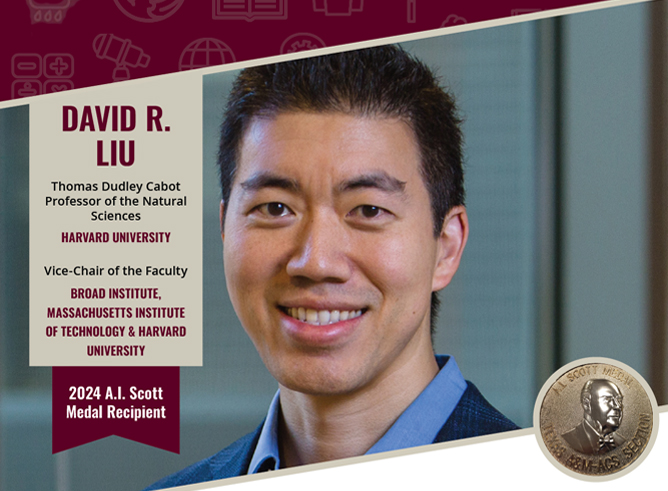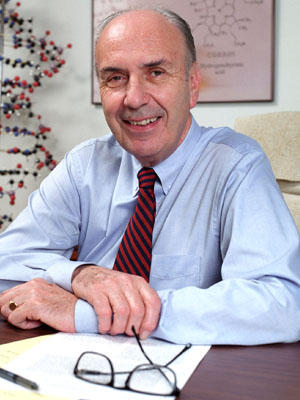
Dr. David R. Liu, Thomas Dudley Cabot Professor of the Natural Sciences at Harvard University and Vice-Chair of the Faculty for the Broad Institute at Massachusetts Institute of Technology and Harvard, has been selected as the 2024 recipient of the A.I. Scott Medal for Excellence in Biological Chemistry Research, named for one of the leading faculty members in Texas A&M University's rich chemistry-related history.
The medal is jointly awarded each year by the Texas A&M Department of Chemistry and the Texas A&M Section of the American Chemical Society (ACS) in tribute to Dr. A. Ian Scott, a Texas A&M distinguished professor of chemistry who made tremendous scientific contributions, both to the university and to the international chemistry community, during his 30-year career.
Liu will be honored during an afternoon symposium set for Friday, Oct. 11, within Texas A&M's Interdisciplinary Life Sciences Building. In addition to Liu's 4:45 p.m. keynote presentation, "Evolved Base Editors, Prime Editors, Recombinases, and Transposases for Targeted Gene Correction and Integration in Cells, Animals, and Patients," the event will feature preceding talks by Google Ventures' Nicole M. Gaudelli, Prime Medicine's Andrew Anzalone and University of Califonia, San Diego chemist Dr. Alexis Komor. The symposium will be followed by an invitation-only dinner, at which Liu will be presented with the Scott Medal.
 Scott was a pioneering chemist who came to Texas A&M in 1977 and achieved worldwide recognition for his discovery of how bacteria produce vitamin B12 as well as his study of the cancer drug taxol. Named a distinguished professor of chemistry and biochemistry at Texas A&M in 1981, Scott held the Robert A. Welch Chair in Chemistry and also was the D.H.R. Barton Professor of Chemistry. He contributed to numerous other works, including breakthroughs related to the essential life pigments chlorophyll and heme along with antibiotics that fundamentally impacted the field of biosynthetic investigation and helped revolutionize both organic and natural product chemistry, before his untimely death in 2007 at age 79.
Scott was a pioneering chemist who came to Texas A&M in 1977 and achieved worldwide recognition for his discovery of how bacteria produce vitamin B12 as well as his study of the cancer drug taxol. Named a distinguished professor of chemistry and biochemistry at Texas A&M in 1981, Scott held the Robert A. Welch Chair in Chemistry and also was the D.H.R. Barton Professor of Chemistry. He contributed to numerous other works, including breakthroughs related to the essential life pigments chlorophyll and heme along with antibiotics that fundamentally impacted the field of biosynthetic investigation and helped revolutionize both organic and natural product chemistry, before his untimely death in 2007 at age 79.
A pioneering bioorganic chemist in his own right, Liu's research integrates chemistry and evolution to illuminate biology and enable next-generation therapeutics. His major research accomplishments include inventing new methods to engineer, evolve, and perform in vivo delivery of genome-editing proteins, such as base editors and prime editors, to study and treat genetic diseases. Base editing — the first general method to perform precision gene editing without double-stranded breaks — was named one of four 2017 Breakthrough of the Year finalists by Science.
Another of the Liu Laboratory’s inventions called phage-assisted continuous evolution (PACE) has enabled the rapid evolution of new proteins with novel therapeutic potential. He also discovered bioactive synthetic small molecules and synthetic polymers using DNA-templated organic synthesis and DNA-encoded libraries. These technologies are used by thousands of labs around the world to study and treat genetic diseases. At least 10 base editing or prime editing clinical trials are already underway to treat diseases, including leukemias, hypercholesterolemia, sickle-cell disease, beta-thalassemia and chronic granulomatous disease, with the first life-saving results of young T-cell leukemia patients already being reported.
Liu graduated first in his class at Harvard College in 1994 and earned his Ph.D. in 1999 from the University of California, Berkeley, where he initiated the first general effort to expand the genetic code in living cells. That same year, he became an assistant professor of chemistry and chemical biology at Harvard University, earning promotion to associate professor in 2003 and to full professor in 2005. Liu became a Howard Hughes Medical Institute investigator in 2005 and joined the JASONs (academic science advisors to the U.S. government) in 2009. In 2016, he became a Core Institute Member and Vice-Chair of the Faculty at the Broad Institute of Massachusetts Institute of Technology and Harvard, as well as director of the Chemical Biology and Therapeutics Science Program.
A member of the National Academy of Sciences and the National Academy of Medicine, Liu is the founder or co-founder of several public and private biotechnology and therapeutics companies, including Beam Therapeutics, Prime Medicine, Editas Medicine, Pairwise Plants, Chroma Medicine, Exo Therapeutics, and Nvelop Therapeutics. He was named one of the Top 20 Translational Researchers in the world by Nature Biotechnology in 2016, 2019, 2020 and 2021 as well as one of Nature’s top 10 researchers in the world and a Foreign Policy Leading Global Thinker in 2017. In addition, he is among STAT News’ STATUS List of 46 leaders in health, medicine and science as well as one of Fierce Biotech’s "Most Influential People in Biopharma in 2023."
For more information on the Scott Medal Symposium, contact Texas A&M Chemistry at (979) 845-9829 or via email at chemhead@chem.tamu.edu.

